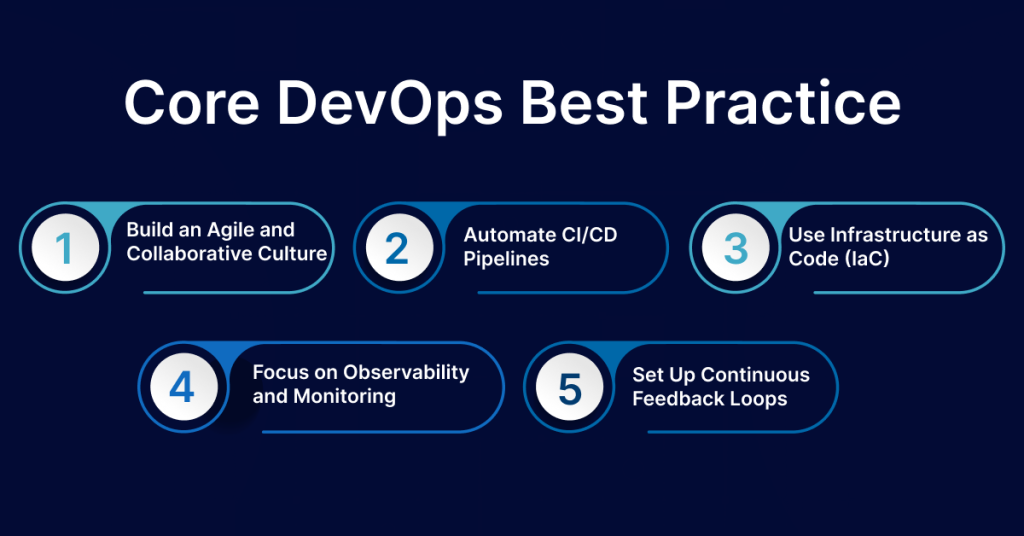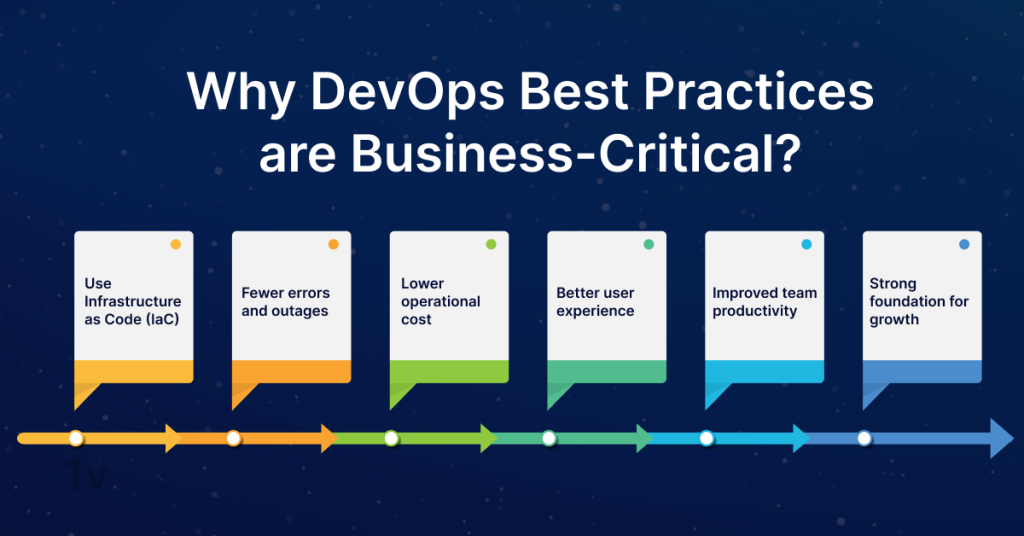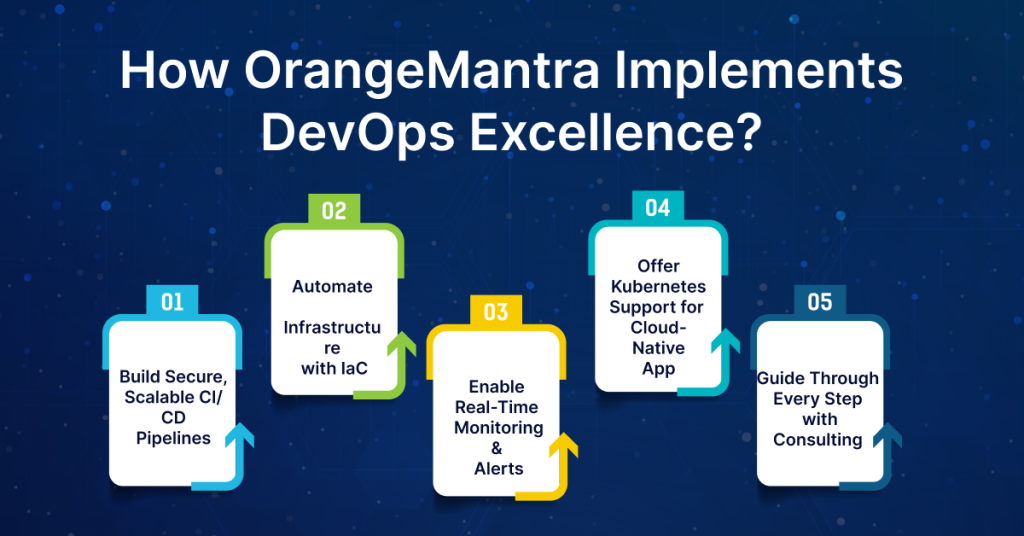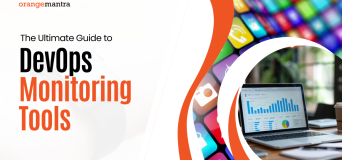
DevOps is no longer optional in 2025—it’s essential. This blog explores why following DevOps best practices is critical for faster releases, improved system stability, and long-term scalability in today’s digital-first world.
By reading this blog, you’ll gain valuable insights into:
- Why DevOps best practices are more important than ever in 2025?
- Actionable tips to strengthen your DevOps strategy
DevOps is a way of working where development and operations teams come together to build, test, and release software faster and more safely. In 2025, DevOps best practices are changing to meet new needs like better security, faster delivery, and smarter tools.
With more companies moving to the cloud and using tools like Kubernetes, there’s a growing need for strong DevOps automation services and DevOps monitoring services.
A recent study found that high-performing DevOps teams deploy code 46 times more often than others. Let’s explore what’s new and what really works in modern DevOps implementation services.
Table of Contents
What’s New in DevOps in 2025?
DevOps is evolving fast in 2025. It’s not just about faster releases anymore; DevOps best practices now focus on smarter tools, stronger security, and better teamwork. Here’s what’s changing:
AI in DevOps
Teams use smart tools to suggest better code, spot bugs early, and automate repeat tasks. This boosts speed and reduces errors in pipelines.
From CI/CD to Continuous Everything
It’s not just code and tests—now monitoring, feedback, and even security happen non-stop.
Stronger DevOps Security Best Practices
Zero Trust is becoming the norm. Every access request is checked. Security is built into the process from the start rather than adding later.
Rise of GitOps and IaC
Teams now use tools like Terraform and Git to manage cloud setups. This makes things easy to repeat, fix, and track.
Need for Expert Help
More companies rely on DevOps consulting services, DevOps automation services, and Kubernetes support to stay ahead.
In short, 2025 is all about speed, security, and smart DevOps implementation services.
Core DevOps Best Practices
To build faster, safer, and more reliable software, teams need to follow the right DevOps best practices. These methods help avoid mistakes, improve teamwork, and reduce delays. Here are the top practices to follow in 2025:
Build an Agile and Collaborative Culture
DevOps starts with people, not tools. Developers, operations, and QA teams must work closely together. When everyone shares the same goals and responsibilities, the software gets built faster and with fewer errors. Good communication is key.
Automate CI/CD Pipelines
Manual work slows things down. By automating code testing and deployment with tools like Jenkins or GitHub Actions, teams can release faster and more often. Features like canary deployments and rollbacks also help reduce risk during updates. Many companies use DevOps automation services to handle this.
Use Infrastructure as Code (IaC)
Setting up servers manually is slow and risky. IaC lets teams manage cloud infrastructure using code. Tools like Terraform and Ansible help keep things repeatable and consistent. It’s a smart part of any DevOps implementation service because it saves time and avoids mistakes.
Focus on Observability and Monitoring
To keep apps running smoothly, teams need real-time monitoring. Tools like Prometheus and Grafana track key metrics like uptime and latency. If something breaks, alerts help fix it fast. That’s why DevOps monitoring services are so important in every setup.
Set Up Continuous Feedback Loops
Feedback helps teams improve quickly. Dashboards show how the system is doing. Developers can see what’s working and what’s not working. End-user feedback also plays a big role in guiding the next update. The goal is to learn fast and fix problems early.
These DevOps best practices help teams stay fast, flexible, and secure.
Also Read – Top DevOps Consulting Companies to Know in 2025
Why DevOps Best Practices Are Business-Critical?
Following the right DevOps best practices isn’t just good for IT teams, but it directly helps the business grow and succeed. Here’s why:
Faster time to market
DevOps helps teams release features quicker, keeping you ahead of competitors and closer to your customers.
Fewer errors and outages
Automation and testing reduce mistakes, leading to better quality and fewer bugs in production.
Lower operational costs
With DevOps implementation services, teams can scale smartly, reuse code, and avoid extra work.
Better user experience
Continuous monitoring catches problems early, so customers don’t run into broken features or delays.
Improved team productivity
Developers spend less time fixing issues and more time building new things that matter.
Strong foundation for growth
With help from DevOps consulting services, companies build systems that are secure, reliable, and ready to scale.
Also Read: Top DevOps Monitoring Tools
Common DevOps Anti-Patterns to Avoid
Even with the best tools, DevOps can fail if the approach is wrong. Here are some common mistakes or “anti-patterns” that teams should avoid:
Treating DevOps as just a tool
DevOps is a culture, not just a set of scripts or software. Teams must work together, not in silos.
Manual setups in production
Setting up servers or environments by hand leads to errors. Use DevOps automation services and Infrastructure as Code to stay consistent.
No rollback plan
Deploying without a way to go back is risky. Every pipeline should include a rollback option in case something breaks.
Security as an afterthought
Waiting until the end to think about security can lead to serious issues. Good DevOps best practices include basic security checks from the start.
Too many tools, not enough strategy
Adding every new tool can confuse teams. Instead, choose tools that fit your goals and train your team to use them well.
By avoiding these pitfalls, teams can build stronger, more reliable systems—and make the most of their DevOps implementation services.
How OrangeMantra Implements DevOps Excellence?
At OrangeMantra, we help businesses move faster, safer, and smarter by following proven DevOps best practices. Our goal is to turn complex systems into smooth, automated workflows that deliver results. Here’s how we do it:
Build Secure, Scalable CI/CD Pipelines
We create automated pipelines that support faster, error-free code releases; saving time and reducing risk.
Automate Infrastructure with IaC
Using tools like Terraform and Ansible, we help teams set up and manage their infrastructure as code. This improves consistency and cuts down on manual work.
Enable Real-Time Monitoring & Alerts
Our DevOps monitoring services include dashboards and alerts that help teams spot and fix issues before they affect users.
Offer Kubernetes Support for Cloud-Native Apps
We help businesses manage microservices and container-based apps through expert Kubernetes support and deployment strategies.
Guide Through Every Step with Consulting
From setup to scaling, our DevOps consulting services help teams choose the right tools, processes, and structure for long-term success.
Whether you’re starting from scratch or improving an existing system, OrangeMantra delivers DevOps implementation services that truly work—built for speed, stability, and growth.
Conclusion
In 2025, following the right DevOps best practices isn’t just helpful; it’s necessary. As software gets more complex and users expect faster updates, teams must build systems that are secure, reliable, and ready to scale.
DevOps is more than just speed; it’s about doing things the right way. Automating what you can, working as one team, and learning from every release. Businesses that follow strong DevOps methods will deliver better products with fewer delays and happier customers.
At OrangeMantra, we’re here to help you do exactly that. From planning to automation, our DevOps implementation services, and expert support make the journey smoother and smarter.
Let 2025 be the year you level up your DevOps game with confidence, clarity, and the right partner by your side.
Frequently Asked Questions
Q1. What DevOps practices are essential in 2025?
Ans. CI/CD pipelines, infrastructure as code, DevSecOps, and cloud-native tools are essential for scalability, security, and speed in 2025.
Q2. How do DevOps practices improve business agility?
Ans. They enable faster iterations, quicker responses to user feedback, and seamless deployment — helping businesses adapt swiftly to changing demands.
Q3. How do DevOps best practices reduce development risks?
Ans. By automating testing and deployments, DevOps minimizes human error, reduces downtime, and ensures reliable, high-quality software releases.








